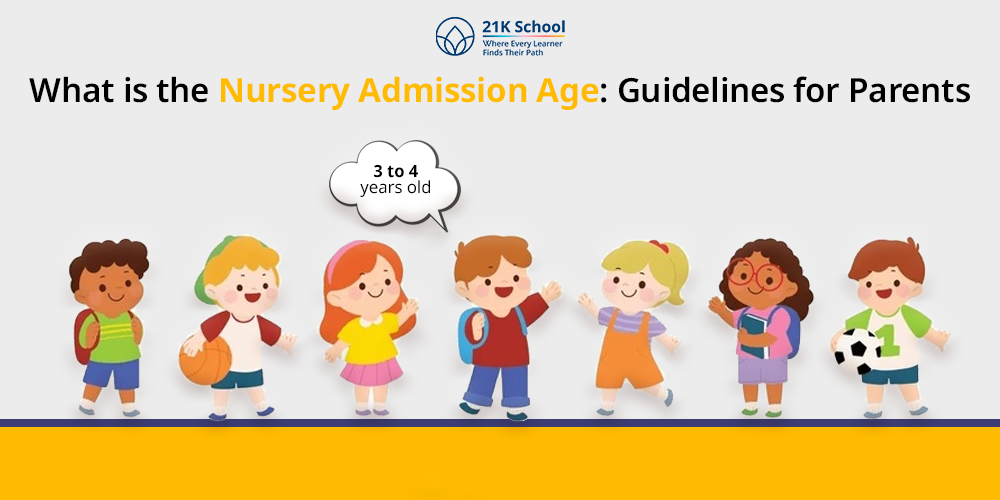
Enrolling your child in a nursery can be an overwhelming decision. However, proper planning and exploring the guidelines can be an effective way for parents.
Nursery school is one of the most important places for any kid’s life where they learn many foundational skills which ensures future growth and success, especially in academics.
But have you ever thought about what the nursery admission age is for children? If not let me tell you it is one of the crucial eligibility criteria needed to fulfill before taking admission.
There are various factors which impact nursery admission like age criteria for example child development, government guidelines, and school policy.
Here is a detailed understanding of nursery admission age criteria and tips for parents to prepare for nursery admission.
Table of Contents
- What is the Ideal Nursery Admission age?
- Nursery Admission Age Criteria in India (2025-26)
- Why is Age Criteria Important?
- Nursery Admission Process & Documents Required
- Understanding Child Development Stages
- Official Age Requirements and Guidelines
- Government Education Standards
- Benefits and Considerations by Starting Age
- Common Challenges Parents Face During Nursery Admission
- Tips for Parents to Prepare for Nursery Admission
- Conclusion
What is the Ideal Nursery Admission age?
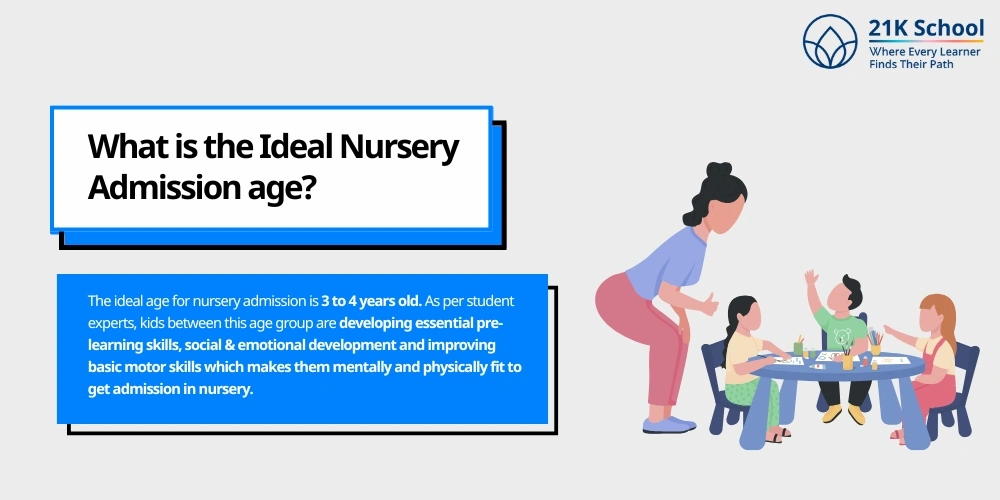
The ideal age for nursery admission is 3 to 4 years old. As per student experts, kids between this age group are developing essential pre-learning skills, social & emotional development and improving basic motor skills which makes them mentally and physically fit to get admission in nursery.
Also, explore various online learning strategies to improve motor skills in young learners.
However every child is different. That’s why some kids join early before completing 3 years while others take time up to 4 or 4.5 years.
Nursery Admission Age Criteria in India (2025-26)
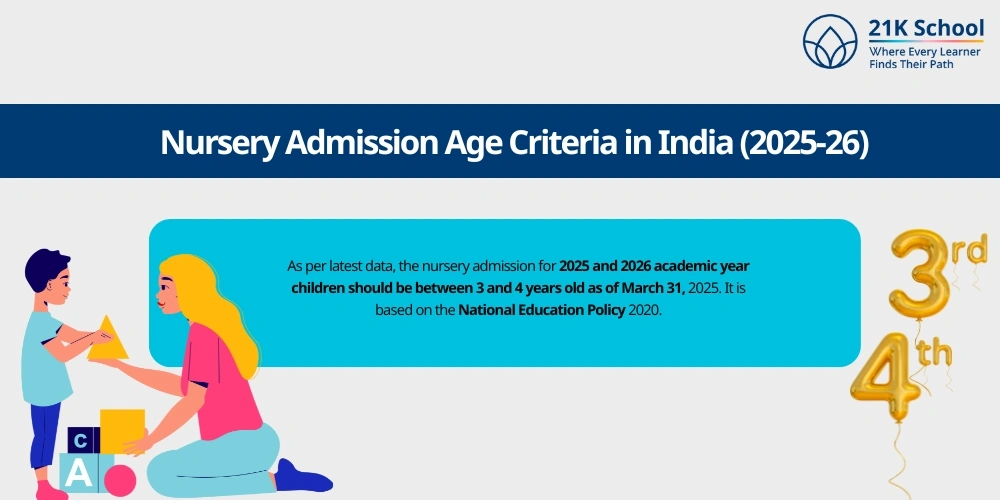
To understand the admission criteria based on age for upcoming year parents can go through the below mention details:
As per latest data, the nursery admission for 2025 and 2026 academic year children should be between 3 and 4 years old as of March 31, 2025. It is based on the National Education Policy 2020.
However, each state and school has their own guideline which should be checked and fulfilled during the admission process.
Why is Age Criteria Important?
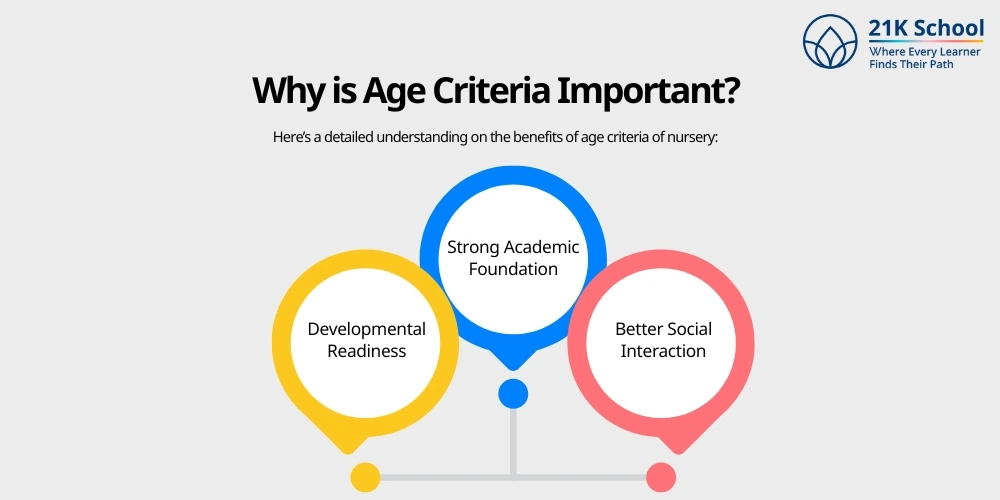
A lot of parents are concerned about why there is an age criteria for nursery admissions. And the answer is that the age criteria ensures the child is mentally developed and makes sure they are ready to learn in a structured school curriculum.
Here’s a detailed understanding on the benefits of age criteria of nursery:
- Developmental Readiness: Age limit is set by schools or state authority to ensure a child has development readiness to deal without a side world. Social, emotional and cognitive development play a major role in classroom settings.
- Strong Academic Foundation: For a strong academic foundation in the start of schooling, the right time is important. This will not only ensure academic success but also provide a better environment to grow.
- Better Social Interaction: Kids with similar or near age groups are more likely to interact and develop positive connections. It’s easy for them to communicate and learn the importance of social skills from each other.
Nursery Admission Process & Documents Required
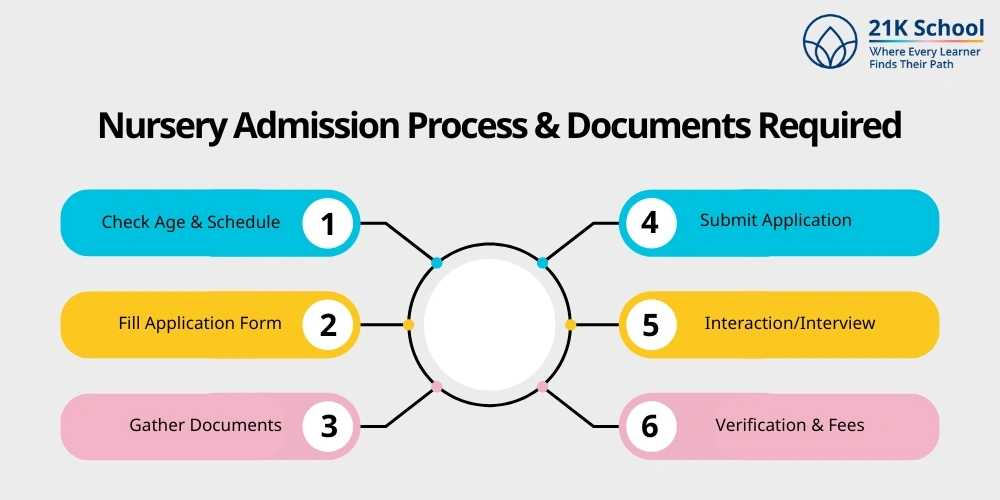
For filling nursery admission form parents need to go through the step by step process and proper documentation to proceed.
Here you can understand each step in detail:
1. Check Age & Schedule
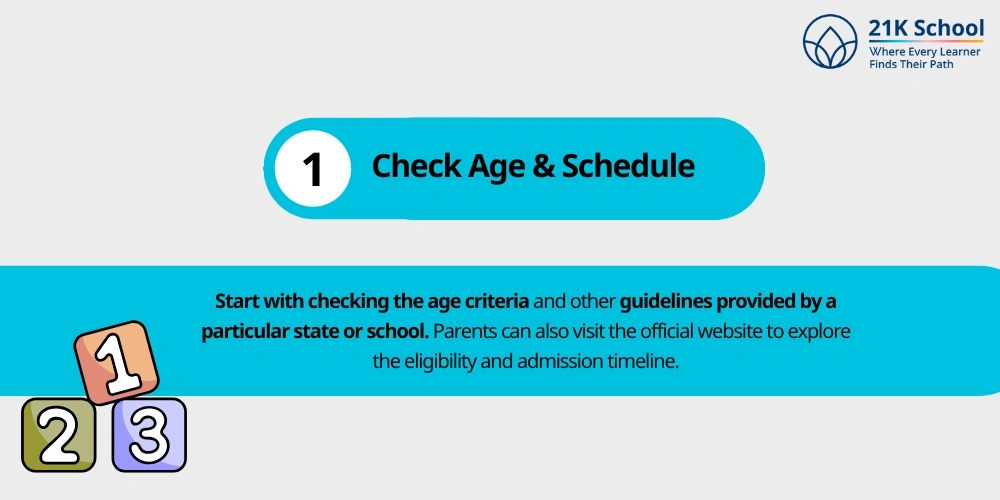
Start with checking the age criteria and other guidelines provided by a particular state or school.
Parents can also visit the official website to explore the eligibility and admission timeline.
2. Fill Application Form
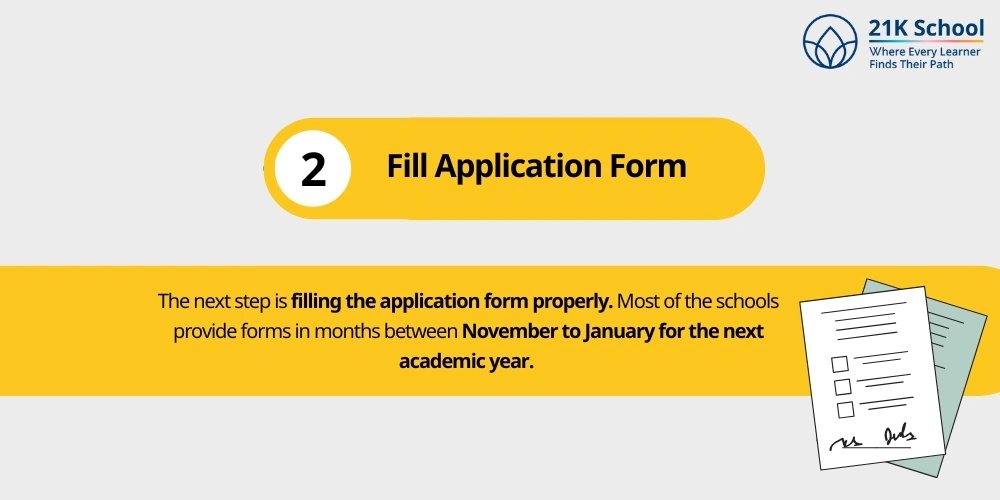
The next step is filling the application form properly. Most of the schools provide forms in months between November to January for the next academic year.
However some offer both online and offline forms to smooth out the process.
3. Gather Documents
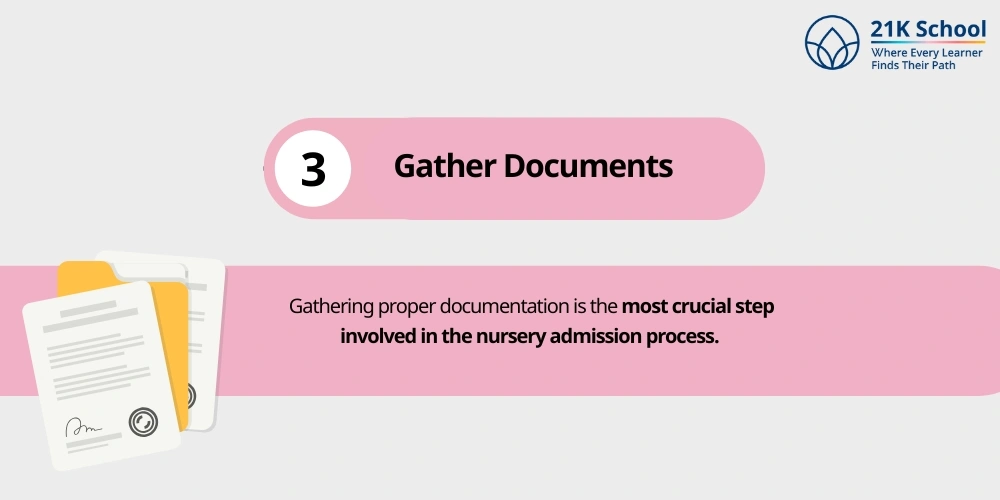
Gathering proper documentation is the most crucial step involved in the nursery admission process. Some commonly required documents are given below:
- Birth certificate as a proof of age.
- Proof of residence.
- Passport-sized photographs of the child and parents.
- Medical records
4. Submit Application
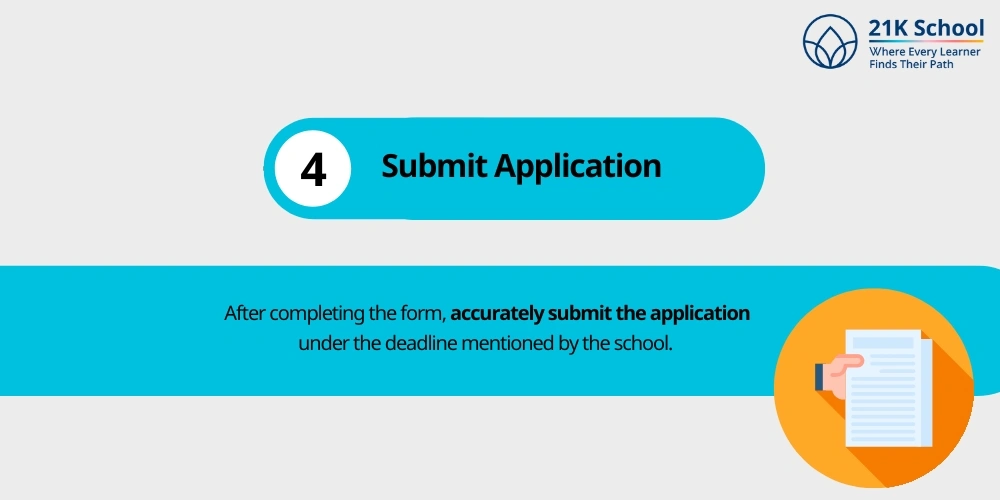
After completing the form, accurately submit the application under the deadline mentioned by the school.
5. Interaction/Interview
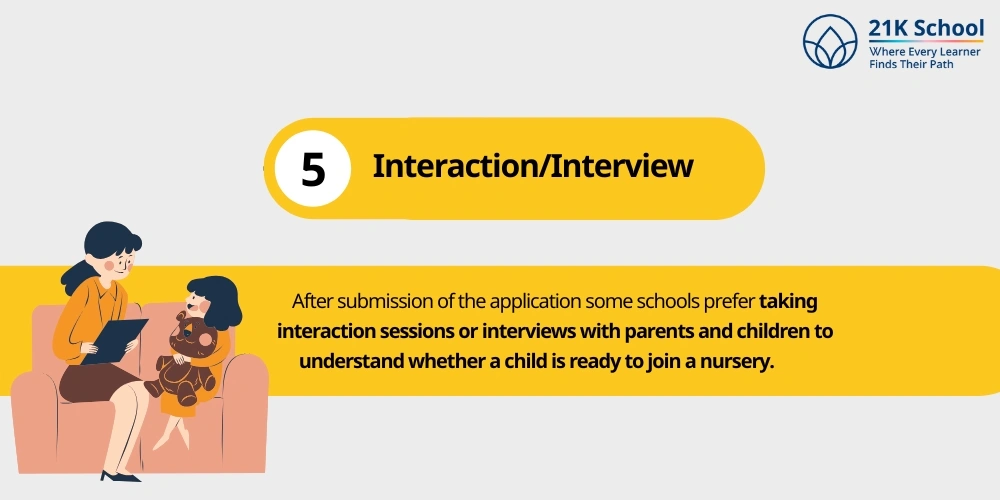
After submission of the application some schools prefer taking interaction sessions or interviews with parents and children to understand whether a child is ready to join a nursery.
6. Verification & Fees
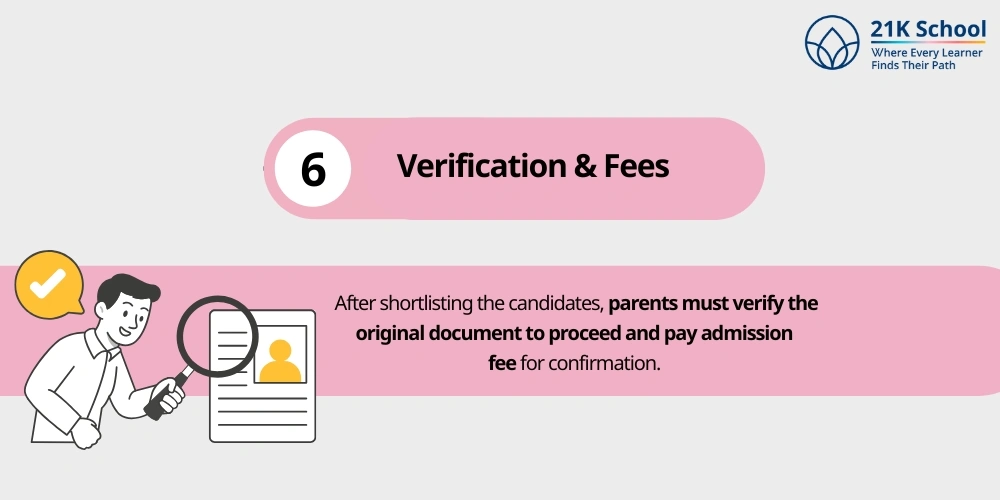
After shortlisting the candidates, parents must verify the original document to proceed and pay admission fee for confirmation.
Understanding Child Development Stages
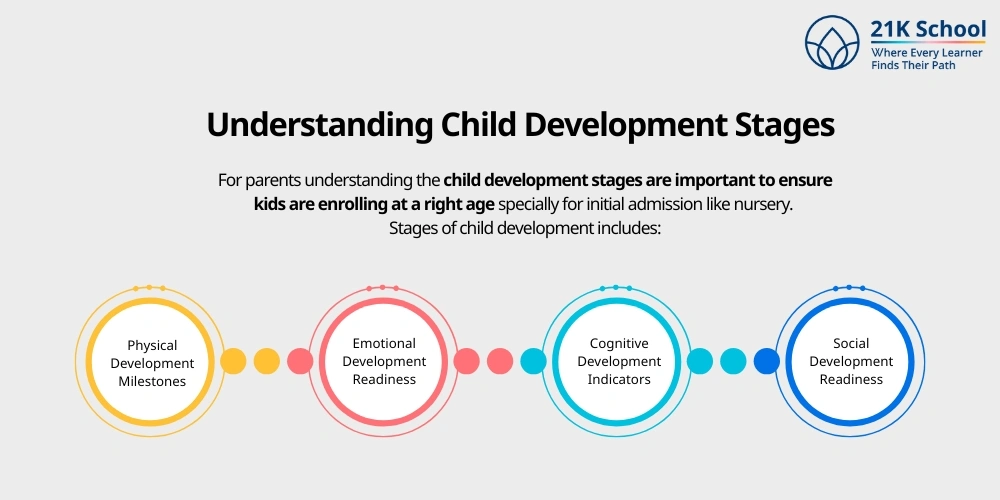
For parents understanding the child development stages are important to ensure kids are enrolling at a right age specially for initial admission like nursery.
Stages of child development includes:
- Physical Development Milestones: Physical development is the first milestone in which at the age of 3 year old children can walk, run and easily grab various tools. The activities for nursery kids include learning to draw, design, painting and activities to improve their motor skills.
- Emotional Development Readiness: Emotional development means kids can express their feelings such as hunger, sadness, happiness etc. They also need to learn short term separation from family and parents.
- Cognitive Development Indicators: Cognitive development indicators means areas of time that kids are able to follow by using their senses. For example, following facilitators for classroom instruction, identifying toys or problem solving games.
- Social Development Readiness: Social development readiness is one of the crucial child development help learners in the classroom to share, interact and help other students. With the help of group activities one can also collaborate with everyone in the classroom.
Official Age Requirements and Guidelines
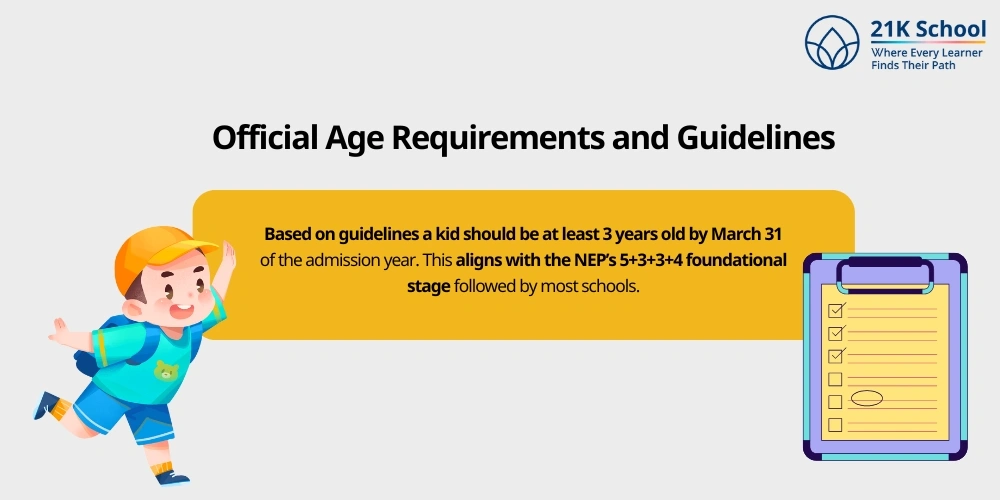
As per National Education Policy 2020, the official age requirement and guidelines should be read by parents before taking admission for nursery.
Based on guidelines a kid should be at least 3 years old by March 31 of the admission year. This aligns with the NEP’s 5+3+3+4 foundational stage followed by most schools.
Government Education Standards
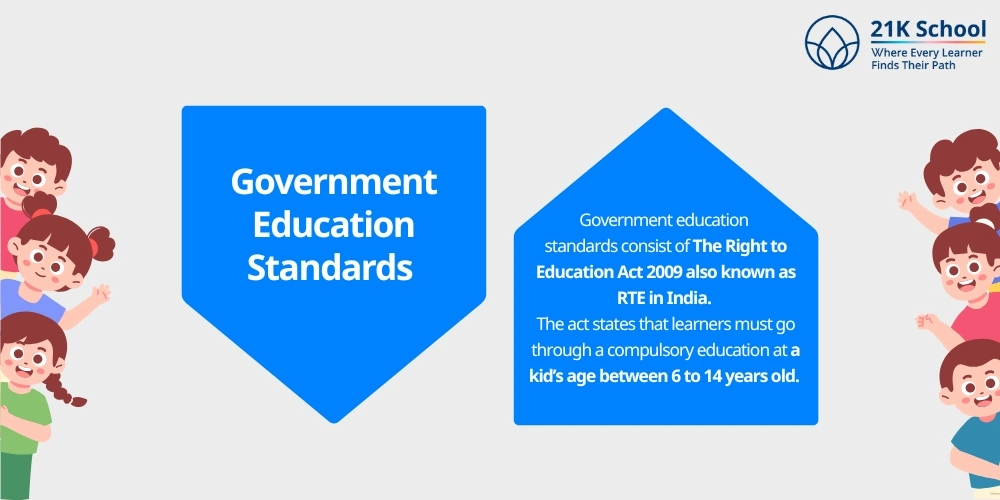
Government education standards consist of The Right to Education Act 2009 also known as RTE in India.
The act states that learners must go through a compulsory education at a kid’s age between 6 to 14 years old.
However early childhood education comes under The National Education Policy 2020 which mainly focuses on child education between 3 to 6 years old and can access nursery to Class 1.
Authoritative Source Requirements:
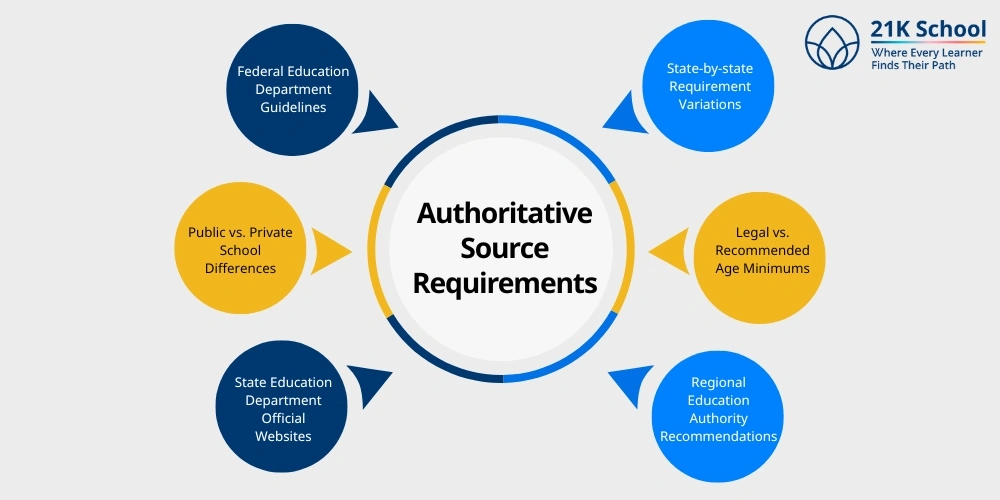
- Federal Education Department Guidelines: The Ministry of Education, Government of India defines pre-school objectives however, leaves age implementation to all states.
- State-by-state Requirement Variations: State-by-state requirement variations for nursery admission may vary for each state.
- Public vs. Private School Differences: Each school has its own guidelines for the age limit. For example, private schools mostly follow CBSE and ICSE age criteria. On the other hand, public preschools follow state ICDS guidelines.
- Legal vs. Recommended Age Minimums: The legal age for admission in nursery is 3 years. However, some schools may consider young kids who are in playgroups.
- State Education Department Official Websites: State Education Department official websites regularly publish new updates related to admission and other details by notifying online.
- Regional Education Authority Recommendations: Regional Education Authority, a government body, provides guidelines related to education by implementing national policies while adapting them to local needs.
Benefits and Considerations by Starting Age
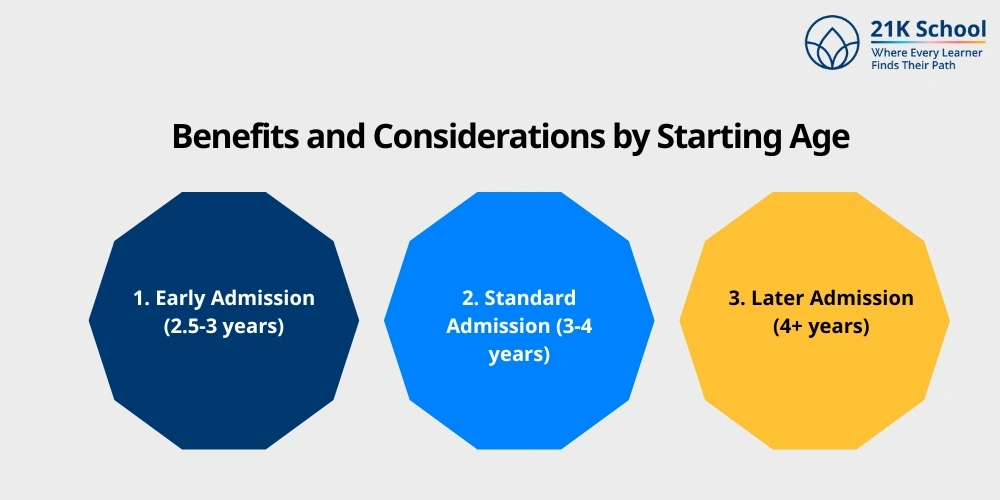
Starting at the right age for nursery admission offers various benefits as well as limitations for both parents and kids.
Here we will explore the primary benefit and considerations of different age group:
1. Early Admission (2.5-3 years)
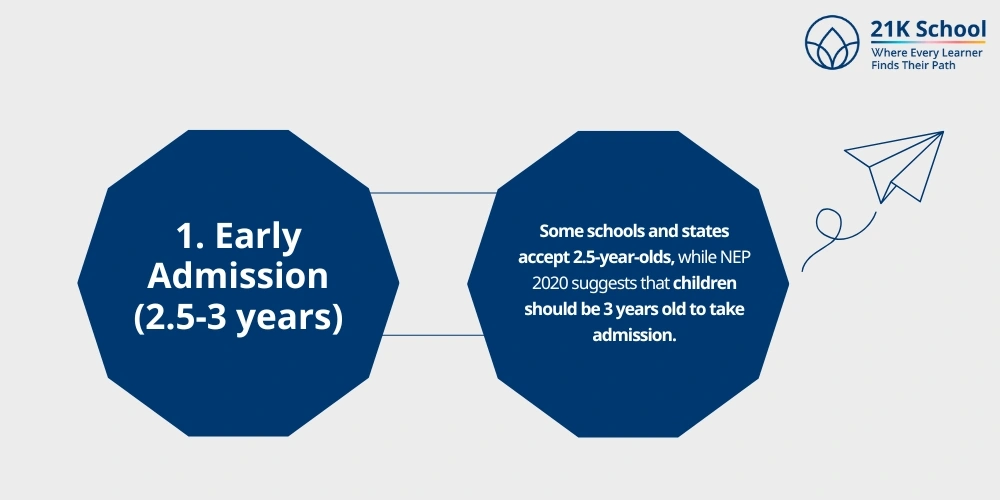
Some schools and states 2.5 years are acceptable while NEP 2020 suggests 3 years old kids to take admission.
It offers benefits such as exposure and connection with the positive learning environment, social interaction and guides kids to learn in a group setting.
While some limitations of early admission include kids face anxiety and stress due to early separation, difficulty to adjust in structure learning and need familiar list learning instead of academic knowledge.
2. Standard Admission (3-4 years)
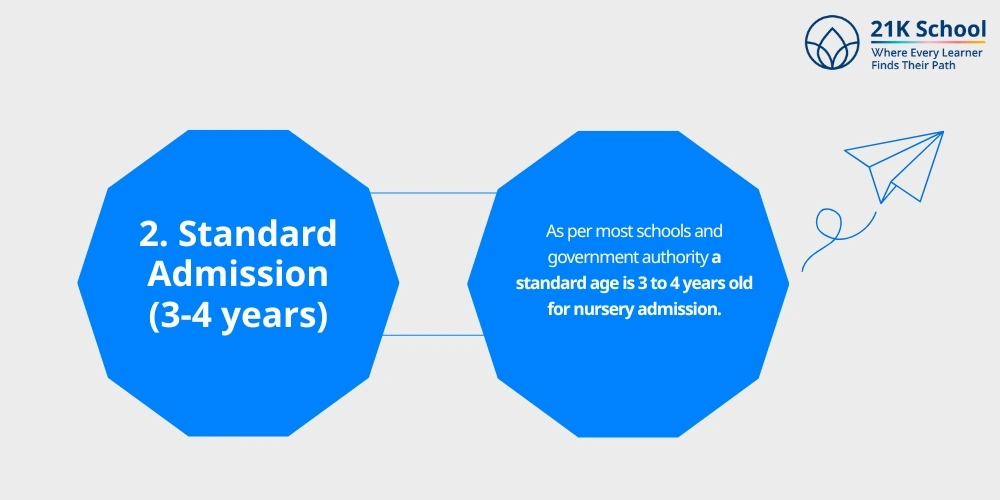
As per most schools and government authority a standard age is 3 to 4 years old for nursery admission.
Kids enrolled in this period get benefits of effective interaction with same age learners and smooth transition to upper grades like LKG and UKG.
Some common drawbacks faced are unavailability of slot / seat of Desire school for high number of applicants or peer group competitive environment.
3. Later Admission (4+ years)
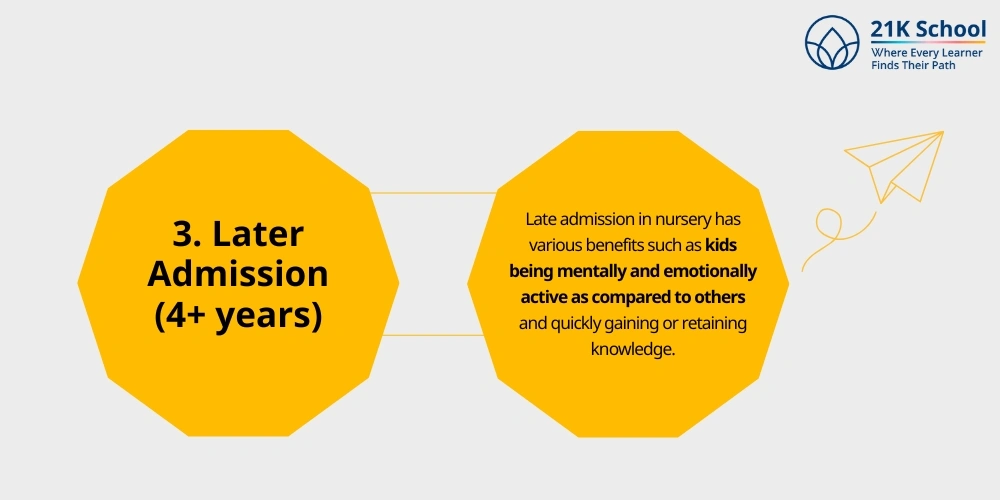
Late admission in nursery has various benefits such as kids being mentally and emotionally active as compared to others and quickly gaining or retaining knowledge.
Drawbacks like difficulty in adjusting and understanding other students or can imbalance for the grade admission.
Common Challenges Parents Face During Nursery Admission
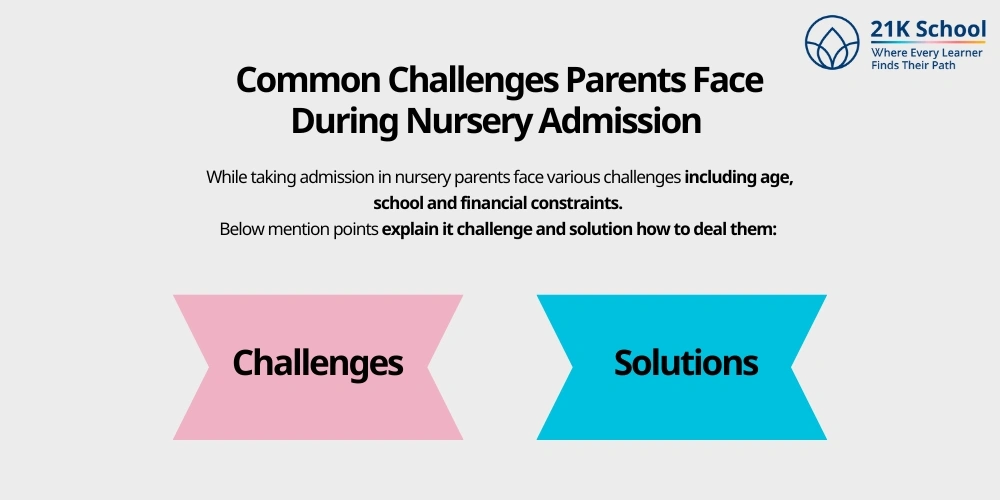
While taking admission in nursery parents face various challenges including age, school and financial constraints.
Below mention points explain it challenge and solution how to deal them:
Challenges
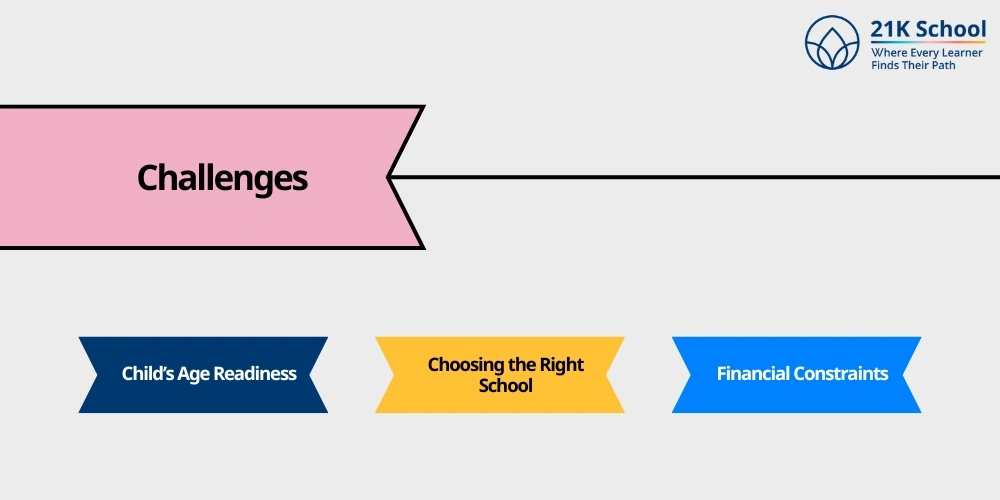
- Child’s Age Readiness: Sometimes kids meet the age criteria but are not socially emotionally and physically ready to and role in nursery admission.
- Choosing the Right School: Selection of the right school is crucial. However, most parents have difficulty while choosing. This is due to differences in curriculum of different boards.
- Financial Constraints: Nowadays, education is expensive. That’s why parents feel financially lost while budgeting the admission to further needs.
Solutions

- Gradual Exposure and Guidance: By providing gradual exposure such as weekly once or twice sending in daycare or creating an environment for skill development at home can be beneficial. Parents can also take expert guidance to understand kids’ requirements.
- Research and Connecting with Councilor: By searching on each curriculum and understanding the best suited one for your kid can resolve the selection problem. Parents can consider the online preschools, explore kids’ needs and connect with counsellors to select the ideal board.
- Explore Options: To resolve financial problems parents can explore supportive options like scholarship or installment plans. They can also budget in advance or compare different schools and areas to choose the right fit nursery.
Tips for Parents to Prepare for Nursery Admission

To reduce mistakes and smooth nursery admission parents can go through some common tips to prepare:
- Research and Plan: Start with researching and planning before taking admission. This will help you to reduce the risk like whether the child is ready, no financial problems or confusion over choosing school or board.
- Familiarise with the School: By visiting campus, the school classroom, playground and other areas will help parents and kids to familiarise the environment and facilitators in advance.
- Encourage Basic Skills: Remember while planning for admission in next academic year parents must encourage kids for the development of basic skills which make them mentally and emotionally fit to take admission.
- Open Communication: Connect with children to make them familiar with school and their working. Let them know why education is important and how they can learn, play and make new friends.
Conclusion
In the initial stage of education of your child selection of the right school, environment and age to enrol is most important for parents.
Taking a rush decision can impact both parents and children for the education and time.
Whether you are looking for early admission, standard admission or late admission, remember to research, analyse and make the best decision for your kid.
Understand the age criteria, curriculum, syllabus and kids’ emotional and mental health to join a nursery. Remember it’s not just about academic growth but also personal development for future success.


